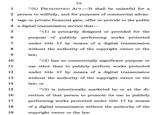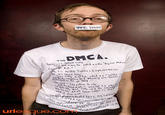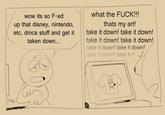Digital Millennium Copyright Act (DMCA)
This submission is currently being researched & evaluated!
You can help confirm this entry by contributing facts, media, and other evidence of notability and mutation.
Overview
The Digital Millennium Copyright Act (DMCA) is an American law governing the use of copyright as it pertains to web-based media and physical electronic media. The DMCA is well known online as the rules governing fair use and media transfer, and is often discussed by those interested in remixing, appropriation, piracy, jailbreaking, hacking and device modification. Many court cases related to the DMCA have had legal ramifications for media consumption throughout the Internet.
Background
The DMCA was introduced as a bill in the House of Representatives by Rep. Howard Coble (R – NC) in 1997, and was voted unanimously into law by the Senate and signed by President Bill Clinton in 1998.[1] The act contains five major acts, the first two of which are relevant to the online handing of copyright and are summarized below. The other three acts mostly pertained to smaller details like practical duties of places like the United States copyright office and the responsibilities of libraries. In addition, several additions and changes have been added to the DMCA, most relevantly rules regarding linking to copyright-protected content.
Title I: WIPO Copyright and Performances and Phonograms Treaties Implementation Act
This section adopted the WIPO Copyright and Performances and Phonograms Treaties Implementation Act, which included the provision that made it illegal to "circumvent a technological measure that effectively controls access to a work" or to traffic in a device or software that would do this, except when the end result was within fair use.[2] So for instance, it is illegal to copy a film from a protected DVD (circumvention), except when the film was to be shown in a classroom (educational fair use). Most instances of jailbreaking, device hacking, and piracy are made illegal under this provision.
Title II: Online Copyright Infringement Liability Limitation Act
This section creates a "safe harbor" for online service providers, including Internet service providers, effectively saying that they are not directly responsible for piracy that is committed by those using services they provide. This means that companies like YouTube and Comcast are not directly liable for piracy that happens by their users; they are protected from lawsuits if, for instance, someone uploads a copyrighted film to YouTube; it is instead the user who is responsible and is the target of legal actions, commonly referred to as a cease and desist or "DMCA Takedown Notice."
However, the protection for YouTube comes with a cost – they must also immediately abide by the takedown notice if one is issued, without evaluating the content for any fair use. If they refuse to remove the content, they can be sued; however, they can reinstate it later if it determined that the content was not copyright-infringing.[7] This has led some content-creators to abuse the takedown notice, issuing them regardless of the rules of fair use.[9]
Notable Developments
Many of the notable developments in the DMCA relate to legal cases that have had wide-ranging implications for those who create and share media online and through other digital means. These have included Sony vs. George Hotz,[4] regarding the rooting of the Playstation console, which resulted in Operation Sony. (More below.)
Another prominent case was Lenz v. Universal Music Corp, where Stephanie Lenz posted a YouTube video of her child dancing to Prince's "Let's Go Crazy," resulting in a takedown notice by Universal Music Corp, who held the copyright to the song.[5] On September 14th, 2015, the Supreme Court of California ruled in favor of Lenz, saying that copyright holders had to consider fair use before issuing a takedown notice. The video has since been reinstated on YouTube. [10]
Related Memes
Operation Sony
In January 2011, Sony Computer Entertainment filed a lawsuit against American hacker George Hotz (handle: GeoHot, best known for “jailbreaking” iPhone) for exposing the root key to a PlayStation 3 machine, which allowed users to develop and play unofficial, homemade games. Then in late February 2011, another PS3 veteran hacker Egorenkov (a.k.a Graf_Chokolo) was raided by the German police and subsequently sued by Sony for publishing the findings of his research on PS3’s security loopholes.
Infuriated by Sony’s legal actions against the two hackers, a contingent within Anonymous networks began attacking Sony-branded websites on April 2nd, 2011.
Office Depot DMCA
Office Depot DMCA was a Digital Millennium Copyright Act takedown notice issued by the legal representatives of the Americans office stationary retailer Office Depot to request for the removal of an image that was posted on Reddit’s self-satirical /r/circlejerk community in April 2013.

Taylor Swift™ No Copyright Infringement Intended
Taylor Swift™ No Copyright Infringement Intended is a phrase used to mock Taylor Swift’s aggressive pursuit defense of the copyright on her lyrics and name, most frequently on Tumblr, where users paste the copyright notice after using a number or phrase that can also be found in a Taylor Swift song or song title.
Additional Meme Effects
It is a common occurrence for the origins or frequent hosts of memes using copyrighted material to receive DMCA takedown notices. Many memes are legally fair use because they are criticism, parody, satire, or in other ways "transformative." However, copyright holders, especially before the 2015 Lenz vs. Universal Music decision, have often not considered fair use when issuing DMCA takedown notices, and ISPs are given no choice but to comply with the notice to remove the content or else open themselves up for a lawsuit. Memes or online personalities that have been affected by the DMCA include but are not limited to:
• The entire video remix genre of YouTube Poop
• Team Fortress 2 Character Voice Remixes
• The entire appropriation genre of Stock Photography
Search Interest
External References
[1] Wikipedia – Digital Millenium Copyright Act
[2] Wikipedia – WIPO Copyright and Performances and Phonograms Treaties Implementation Act
[3] Wikipedia – Safe Harbor
[4] Wikipedia – Sony Computer Entertainment America, Inc. v. Hotz
[5] Wikipedia – Lenz v. Universal Music Corp..
[6] Wired – The Digital Millenium Copyright Act
[7] Wired – 10 Years Later, Misunderstood DMCA is the Law That Saved the Web
[8] Stanford – What is Fair Use?
[9] Electronic Frontier Foundation – Absurd Automated Notices Illustrate Abuse of DMCA Takedown Process
[10] The Guardian – YouTube 'dancing baby' case prompts fair use ruling on copyrighted videos
Recent Videos
There are no videos currently available.









Top Comments
Ryumaru Borike
Sep 19, 2015 at 02:16PM EDT
ballstothewall Moderator
Sep 19, 2015 at 12:53PM EDT in reply to